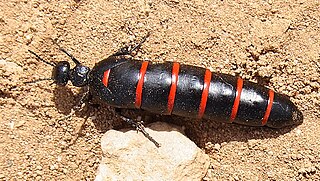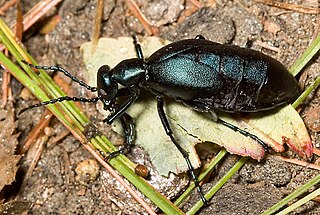
Blister beetles are beetles of the family Meloidae, so called for their defensive secretion of a blistering agent, cantharidin. About 7,500 species are known worldwide. Many are conspicuous and some are aposematically colored, announcing their toxicity to would-be predators.

Meloe is a genus of blister beetles commonly referred to as oil beetles. The name derives from their defensive strategy: when threatened they release oily droplets of hemolymph from their joints. This fluid is bright orange and contains cantharidin, a poisonous chemical compound. Wiping the chemical on skin can cause blistering and painful swelling of the skin. This defensive strategy is not exclusive to this genus; all meloids possess and exude cantharidin upon threat.

Meloe angusticollis, commonly known as short-winged blister beetle or oil beetle, is a species of blister beetle, native to North America. They average 8–10 millimetres (0.3–0.4 in) in length.

Berberomeloe is a genus within the tribe Lyttini of the family Meloidae, the oil or blister beetles. It includes two species, the red-striped oil beetle, Berberomeloe majalis, and the less flamboyant Berberomeloe insignis.

Meloinae is a subfamily of beetles in the family Meloidae. There are at least 330 described species in Meloinae.
Meloe carbonaceus is a species of blister beetles in the family Meloidae. It is found in North America.

Meloe impressus is a species of blister beetle in the family Meloidae. It is found in North America.
Meloe ajax is a species of blister beetle in the family Meloidae. It is found in North America.
Lytta morrisoni, or Morrison's blister beetle, is a species of blister beetle in the family Meloidae. It is found in North America.
Meloe dianella is a species of blister beetle in the family Meloidae. It is found in North America.

Meloe americanus is a type of blister beetle (Meloidae) found in North America. It is most relevant to the fields of agriculture and veterinary medicine. Adult beetles feed on different types of plants, which cause crop damage. They also release a fluid containing a chemical that is toxic, and at high concentrations lethal, to mammals. The first instar larvae are uniquely active and mobile, utilizing phoresy and parasitism to feed and mature through their developmental stages.

Lytta sayi, the Say blister beetle, is a species of blister beetle in the family Meloidae. It is found in North America.

Meloe campanicollis is a species of blister beetle in the family Meloidae. It is found in North America.
Meloe occultus is a species of blister beetle in the family Meloidae. It is found in North America.
Meloe niger, the black meloe, is a species of blister beetle in the family Meloidae. It is found in North America.
Meloe dugesi is a species of blister beetle in the family Meloidae. It is found in Central America and North America.
Lytta vulnerata is a species of blister beetle in the family Meloidae. It is found in Central America and North America. The are called "blister beetles" because of a compound called cantharidin that causes blisters when coming in contact with skin.
Meloe franciscanus is a species of blister beetle in the family Meloidae. It is found in the deserts of the southwestern United States. The larvae are parasites of bee larvae, eating them and consuming their provisions.
Meloe bitoricollis is a species of blister beetle in the family Meloidae. It is found in North America.
Meloe strigulosus is a species of blister beetle in the family Meloidae. It is found in Central America and North America.








